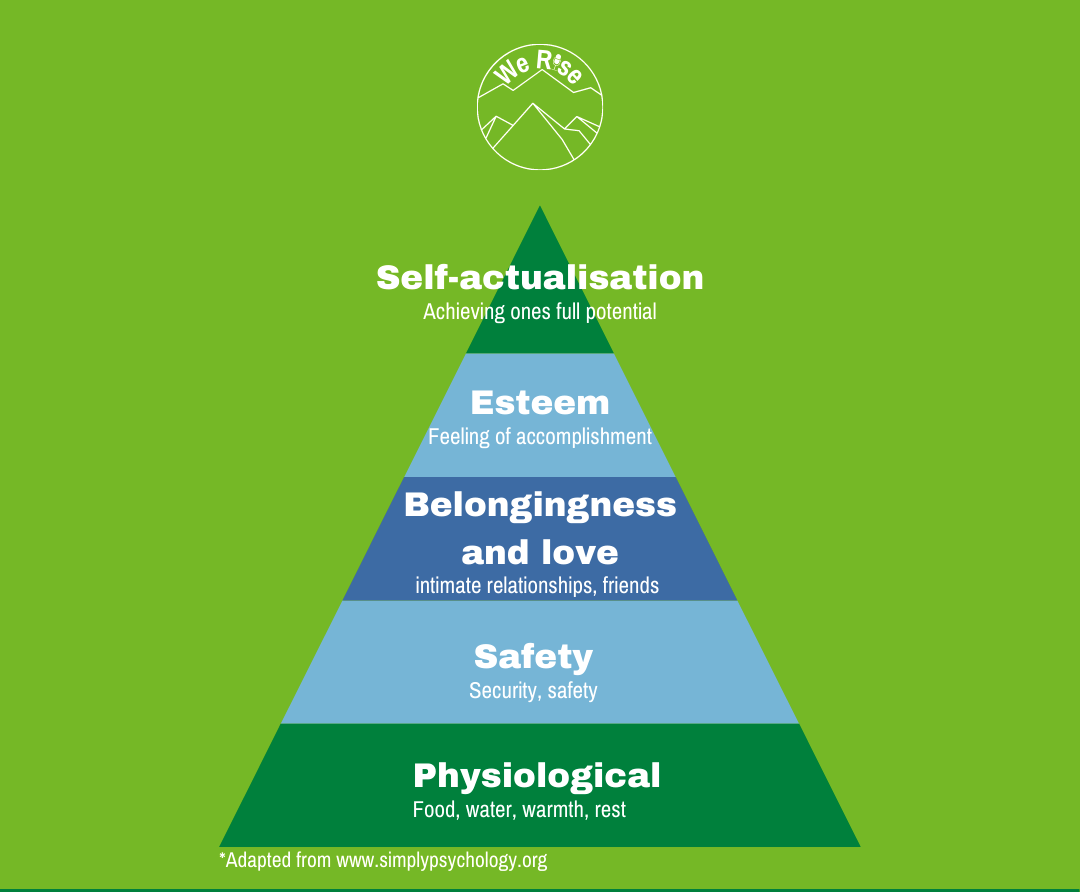Welcome back!
A huge part of adulting is finding yourself, understanding your passion and striving for finding purpose. This is something I have explored on the We Rise Podcast in some detail. This is where Maslow’s Heirachy comes in. I touched on this concept in my purpose episode specifically around self-actualisation as it is thought once you can achieve this, you will find your purpose (debatable, but let’s roll with it). Oh, and if you haven’t already, check out the episode here:
What is Maslow’s Heirachy of Needs?
Maslow’s hierarchy of needs is the idea that humans are motived by needs which can be assessed in a hierarchy - I know many of you are like:
But keep reading…
Within this concept, needs are are organised in such a way that the basic needs are at the bottom and higher needs at the top culminating in self-actualisation:
self-actualisation
noun
the realisation or fulfilment of one's talents and potentialities, especially considered as a drive or need present in everyone.
Where is the link I hear you ask? Well, I was recently watching a programme and the idea came up that to be truly happy, or fulfilling your purpose or passion, your lower needs have to be met.
I had a light bulb moment because until then I had never really thought of this concept as the possible path to living your best life.
Before I start breaking it down, you need to know what it is. So, looking at the Heirachy of Needs from the bottom upwards:
Physiological Needs - these are requirement for human survival; food, drink, shelter etc.
Safety Needs - The need to experience order, predictability and control of your life. There are various types including financial security, emotional security, health and wellbeing etc.
Love and belongingness Needs - All around interpersonal relationships with family, friends work etc.
Esteem Needs - these can be internal so to do with your own personal achievement, mastery of independence or external which is around the desire for reputation and respect for others.
Self actualisation - realisation of your potential, feeling personal growth - this is the level where you have the desire to accomplish everything you can do.
This has been expanded since, and you can read more here, but for simplicity purposes, I’m going to look at the five stages.
What’s the link I hear you ask?
I’ve found this this triangle so interesting because it really got me thinking about this process with relationship to adulting and the different motivators as you move through from early adult to fulled fledged adult.
Step 1 - You leave university or enter a new chapter in your life and for some people you feel lost (check out episode 1) with financial issues sometimes being at play making it difficult to meet you physiological needs and sometimes safety needs too.
Step 2 - You secure a job, and start to work through these basic needs, however changes in environments i.e. from relationships to moving cities can be your next stumbling block.
Step 3 - Your goal is to get a job and not think much further than that so when you have achieved that, it can be difficult to get that esteem or feeling of accomplishment.
Step 4 - And then once you find that, it takes some soul searching to understand and work to your talents and gifts whilst also meeting a humans need.
*whew* I don’t know about you but I’ve just come to the realisation why adulting is so exhausting, its like a battle of all these competing things WHILST trying to keep it ‘together’.
This is very simplified and it’s worth mentioning that you don’t need all the basic needs to move onto the next. In fact this concept has been debunked with criticism on the approaches and also:
“Needs are not hierarchical. Life is messier than that. Needs are, like most other things in nature, an interactive, dynamic system, but they are anchored in our ability to make social connections. Maslow's model needs rewiring so it matches our brains. Belongingness is the driving force of human behavior, not a third tier activity. The system of human needs from bottom to top, shelter, safety, sex, leadership, community, competence and trust, are dependent on our ability to connect with others. Belonging to a community provides the sense of security and agency that makes our brains happy and helps keep us safe.”
But making that realisation or connecting those dots is quite interesting to understanding some of the issues we face through adulting.
What do you think? Do you agree, let me know in the comments or on social media.
References
https://www.simplypsychology.org/maslow.html#gsc.tab=0
Alternative Theory: https://medium.com/@hwabtnoname/maslow-s-hierarchy-of-needs-vs-the-max-neef-model-of-human-scale-development-9ebebeabb215



